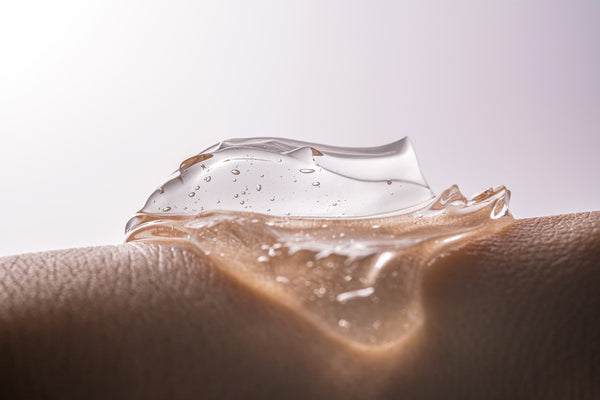Ceramide skin care is a top UK beauty trend and the past 5 years has seen a 576% increase in global searches for “ceramide serum”.
But what are ceramides and does your skin actually need them? In this post we explain why ceramides are used in skin care and show you how to use our natural ceramide moisturiser to support your skin’s health, balance and barrier function.
What are ceramides in skin care?
Ceramides are lipid that are naturally present in the top layers of skin, with the highest concentration found in the spaces between the cells in the stratum corneum. An easy analogy that can help you to visualise these lipids is to think of them as a mortar that seals any gaps between the skin cells.
Ceramides can also be found in many of the plant oils that we use to formulate our skin care and, when applied to the skin, they help to maintain the integrity of the stratum corneum.

Plant oils used in skin care that are known to be a good source of ceramides and essential fatty acids include:
- Jojoba Oil
- Sunflower Oil
- Grapeseed Oil
- Sunflower Oil
- Hemp Oil
Why does skin need ceramides?
If your skin does not have ceramides helping to seal in hydration, it could become more prone to dehydration. This puts your skin at risk of irritation, itchiness and discomfort from sensitisers.
To explain this in more detail, your skin’s balance relies on a constant source of moisture and lipids. When lipids, like ceramides, are present, your stratum corneum can perform effective barrier functions that control the volume of moisture that goes in and out of your skin. It can also provide a first line of defence against irritants and bad bacteria.
However, if your skin’s hydration and lipid levels are low and cracks form in the stratum corneum, this protective layer can become an easy entry point for skin sensitisers.
Ceramide levels decreases with age, and without ceramides, water can be easily lost from the skin’s surface, leading to more cracks, skin dehydration and discomfort.
Without ceramides, water can be easily lost from the skin’s surface, leading to more cracks, skin dehydration and discomfort.
Supplementing your diet with vitamin C has been linked with stimulating ceramide production[i] but the best way to maintain your skin barrier is to moisturise regularly using ceramide skin care that’s formulated with hydrating humectants that help anchor moisture to the skin and plant oils, such as those mentioned above, which can supply the skin with the lipids it needs to retain moisture.
Discover our natural ceramide moisturiser
We all need a regular top up of ceramides so we made our Scent Free Truffle Night Cream to be suitable for all skin types, genders and ages.
This luxurious, natural ceramide moisturiser features Northern Truffle, a remarkable active found in Finnish forests. This ingredient has been clinically tested and shown to help even ultra-sensitive skin find its ‘feel good’ state.

It does this by inhibiting receptors in the skin responsible for inflammation, irritation, and pain, and thereby enhancing the tolerance to the many stresses that skin can encounter daily, including heat stress, pollution and irritants.
Entirely scent-free, Truffle Night Cream also gives skin a rise and shine glow and is enriched with a moisture-binding blend of Ceramides, Hemp Seed Oil, Cellular Apple Water and Glycerine.
These sink in overnight to reset skin hydration levels, leaving skin plump, firm, soft and fresh.

Scent Free Truffle Night Cream 50ml
Soothe, calm and repair with this Ceramide and Truffle sleep cream
€37,95
When does skin most need ceramides?
Ceramides in skin care are ‘skin-identical’ ingredients that can replenish the ceramides in your skin. This helps your skin to look and act like younger skin and keeps it hydrated, firm and supple.
There are also occasions when skin needs a more intense moisturisation with ceramide skin care.
Ceramide skin care for night-time
At night skin can be vulnerable to trans-epidermal water loss, which can leave your skin feeling tight and dehydrated. You can help to support your skin by applying a moisturising ceramide night cream that feeds ceramides and hydrating-anchoring actives into the skin.
We suggest Scent Free Truffle Night Cream which blends ceramides with Hemp Seed Oil, Apple Cellular Water, Glycerine (a humectant) and Northern Truffle, an active clinically show to help to soothe and calm an irritated skin barrier.

For best results, apply to freshly cleansed skin before bedtime, layering over Scent Free Hyaluronic Booster Serum when your skin needs an extra burst of hydration. This gives your skin a powerful boost of ceramides and Hyaluronic Acid together.
Ceramides for older skin
Older can also benefit from regularly using ceramide skin care. This is because mature skin contains fewer ceramides and the quality of ceramides produced by the skin decreases as we age.
Older skin also becomes thinner with age and this leave the skin barrier less able to hold onto moisture and more vulnerable to damage and irritation.
Key to preventing dryness and irritation in older skin is maintaining a strong skin barrier using plant extracts and oils that are rich in ceramides and hydrating properties.
To lock hydration in, layer your preferred Age Defy+ serum and moisturiser, then seal in their hydrating benefits by applying Cell Enrich Facial Oil which is made using Jojoba, Sunflower and Squalane – an oil derived from Olive that’s known for its moisturising properties.

At night, apply Scent Free Truffle Night Cream to freshly cleansed skin.
Ceramide skin care post-illness
If illness or medication has left your skin feeling dry and irritated, ceramide skin care can help to restore skin barrier function and relieve discomfort.
Skin can be unpredictable when it is out of sorts and may feel more sensitive. For these reasons it’s a good idea to use very gentle, scent-free skin care when recovering from illness.
We suggest our Scent Free collection, which offers a straightforward way to replenish skin with moisture and ceramides.
Ceramide skin care for winter
Winter is another good time to support your skin’s ceramide level as drying central heating and exposure to the elements can both damage and dehydrate the skin barrier.
To help your skin hold onto moisture for longer, replenish your skin’s lipids by layering products formulated using natural extracts which are rich in ceramides and have hydrating properties.
The best way to layer ceramide skin care is to apply a ceramide serum first, followed by a hydrating winter moisturiser. To seal their hydrating properties into the skin, apply a few drops of a facial oil made with plant oils that are rich in ceramides.
We recommend Anti-Ageing Facial Oil which is made using Jojoba and Sunflower Oil – two protective plant actives that are rich in fatty acids and known for their excellent softening and moisture retaining properties.

Anti Ageing Facial Oil 30ml
Lock in soft skin hydration with this natural and organic facial oil
€33,95
Ceramide skin care after sun exposure
Spells of sunny weather can damage the skin barrier and a protective SPF face cream should be applied daily.
In addition to SPF, skin relies on a high percentage of ceramides to keep its barrier strong enough to help stop harmful long-wave sun rays damaging the deeper levels of skin.
If your skin does become damaged or irritated by sun exposure, choose a ceramide moisturiser that’s made with ingredients known to help the skin to soothe and repair itself at night.
The Truffle used in Truffle Night Cream is clinically proven to protect against infrared stress by suppressing skin reddening and inflammatory reaction.
This ceramide night cream also features Hemp Seed Oil, a natural active that helps skin discomfort by soothing irritation and increasing the natural moisture-retention capacity of the skin.
Could your skin benefit from ceramide skin care? For more information and advice on using ceramide moisturiser and other products in your beauty routine, please contact our friendly UK customer care team on 01403 740350.
If you wish to republish this content, please credit Green People as the original creator with a link to "Ceramides in skin care: what you need to know" Please do not use an affiliate link.
[1] https://www.ncbi.nlm.nih.gov/pmc/articles/PMC4624068/








